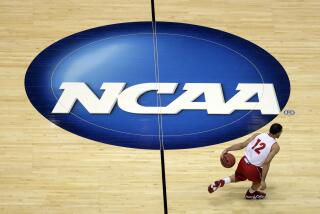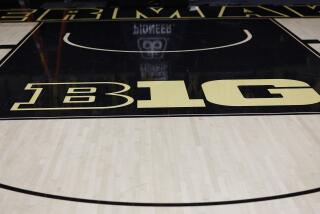NCAA Directors to Vote on Exempt-Event Proposal
- Share via
Chaminade beats Virginia in a legendary game in 1982 and the tiny Hawaiian school named after a French priest takes its place in college basketball lore. As does little-known American University of Puerto Rico 15 years later, when it knocks off then-unbeaten Arkansas.
Colorado State’s one-point victory over UCLA in 1999 at a Hawaii tournament may not be of storybook quality--though not in a tournament, Cal State Northridge’s stunner a year later would carry that label--but Bruin alumni never forget.
Those tournament stepchildren-turned-stars and others are on the verge of returning to oblivion. Far-flung early-season basketball tournaments have been in jeopardy since conference commissioners voted in September to eliminate exempt events.
Earlier this month the NCAA management council set the college basketball schedule at a maximum 29 games, voting to force those tournaments--which had counted as one game against a team’s previous total of 28--to be counted as two, three or four games, depending on how far a team advances in a tournament.
On Thursday, the NCAA’s board of directors, which consists of university presidents, will vote on the proposal and consider other issues, such as whether student-athletes should be able to receive money for giving private lessons, and whether they can obtain a bank loan based on future earnings.
The future of the exempt events, however, has generated the most controversy. Coaches dislike the proposal, especially those from mid-major programs who look for exempt events to enhance their power rating for NCAA tournament consideration.
In December, in anticipation of the legislation passing, a group of college basketball promoters filed suit against the NCAA to protect their commercial interests. An attorney for the promoters, Bill Markovits, said Monday that seeking a preliminary injunction to maintain the status quo was an option.
“It’s all about money,” he said. “These tournaments are run generally when there are no classes, unlike the conference tournaments and the NCAA tournament, when there are a ton of classes. It’s pretty clear the students love these tournaments, the coaches love these tournaments. The tournaments are good for everybody with the possible exception of the large conferences and NCAA that want to keep the money in-house.”
Said NCAA spokesperson Jane Jankowski: “The plaintiffs are essentially complaining about being treated the same as everyone else. The legislation that has been proposed, it does not prohibit any of those contests. All it does is simply count each game played toward maximum game limits. So we believe what this legislation does is promote competitive equity. You would not have schools that would be playing many more games than others.”
Chris Spencer, executive director of Worldwide Basketball, which runs the Puerto Rico Classic, sounded, at times, resigned to his fate. The measure, if approved, would take place in 2002.
“I’m going out of business, what do I care?” he said.
But later, he felt better about the group’s chances of prevailing.
“I’d say 310 [coaches] out of 320 would say, ‘Let’s keep them,’ ” he said. “You’ve had some big-time coaches blasting this. This is not about asking what the coaches want. This is about conference commissioners who want more money, more games, so they can get more money from ESPN by adding a couple of games.
“They don’t like the fact that maybe an Indiana State upsets a Syracuse in one of these tournaments and maybe at the end of the year the Missouri Valley may get two bids instead of [just] their automatic and it takes away from the Pac-10 or Big Ten or Big East or whatever.”
Jim Haney, executive director of the National Assn. of Basketball Coaches, confirmed that his membership is displeased by the pending development, particularly in light of this season’s selection process for the NCAA tournament.
“‘From our perspective, it’s nearly unanimous, this is not good legislation,” he said. “Like most things, regular-season regulations have postseason ramifications. The message for the men’s basketball committee coming out of the postseason championship was strength of schedule was important, you had to prove you deserved to be in. Creighton got in because of what they were able to accomplish in exempted contests. Georgia got in because of its overall strength of schedule.”
He said the rule change eliminates opportunities for mid- and lower Division I programs and conferences. The chance to play an elite school on a neutral court will greatly diminish.
“For those who love basketball, it basically takes college basketball off the front page until the tournament,” he said. “In the fall you get some interest and some excitement about college basketball around these exempted contests.
“It creates something special. I respect the fact the ACC can play the Big Ten and those kind of things, but that’s not the same as playing in a national event with teams from different parts of the country.”
More to Read
Go beyond the scoreboard
Get the latest on L.A.'s teams in the daily Sports Report newsletter.
You may occasionally receive promotional content from the Los Angeles Times.











